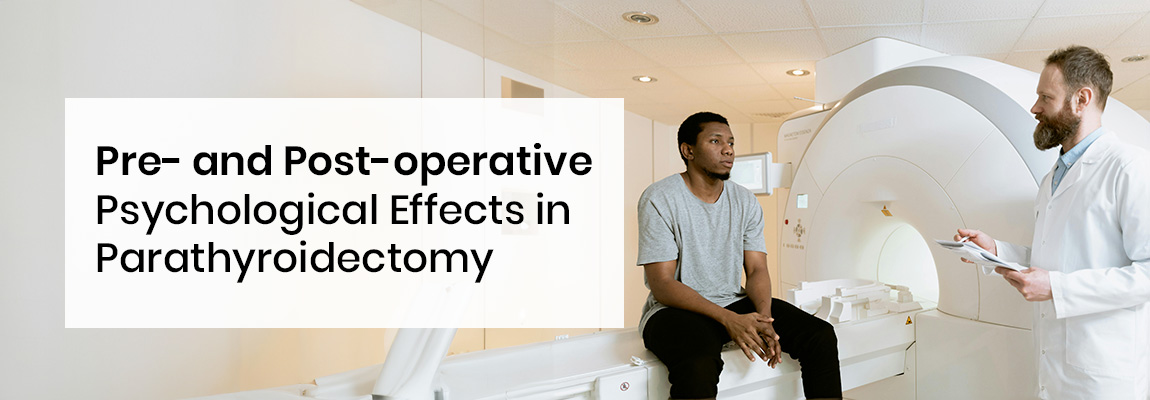
Parathyroidectomy, also known as parathyroid surgery, is a surgical process that involves the removal of one or more parathyroid glands or tumors affecting the parathyroid glands. The parathyroid glands, each approximately the size of a grain of rice, are situated behind the thyroid gland at the base of the neck.
Parathyroid glands generate parathyroid hormone, which is crucial to regulating the level of calcium in the blood and in tissues that need calcium for optimal functioning. This hormone is necessary for the normal functioning of nerves and muscles, as well as for maintaining strong and healthy bones.
This surgical procedure is commonly used to treat hyperparathyroidism, a condition in which the parathyroid glands are overactive and produce too much parathyroid hormone. It cures primary hyperparathyroidism and may also be recommended for treating secondary hyperparathyroidism when non-surgical treatments are ineffective.
Psychological Effects of Parathyroidectomy
Before and after parathyroidectomy, patients may experience psychological effects. This can include feelings of anxiety, stress, and even depression sometimes. Feeling distressed during the procedure and concerned about their overall health can also be included. After the surgery, some patients may feel relieved, need to adapt to changes in hormone levels, and experience stress during the recovery process.
A study in the Journal of ScienceDirect shows the pre and post-psychological effects of Parathyroidectomy. Before surgery, the hyperparathyroid group had higher calcium and parathyroid hormone levels. They also showed psychological distress. One month after surgery, there was a significant improvement in symptoms.
The psychological effects before and after parathyroidectomy surgery
Numerous studies indicate that individuals undergoing parathyroidectomy may encounter various psychological impacts prior to and following the surgery. Before the operation, patients may struggle with feelings of anxiety and unease related to the upcoming procedure. This could be due to worries about the surgical process and the underlying health issue requiring the operation. The uncertainty regarding the surgery’s results and its potential influence on their general well-being may lead to increased psychological distress in these patients.
Following the parathyroidectomy, patients may continue to navigate various emotional responses as they recuperate. Many individuals experience a sense of relief after the successful removal of the parathyroid gland, mainly if it alleviates symptoms associated with hyperparathyroidism. They might also need to adjust to changes in hormone levels post-surgery, which can influence their emotional well-being and overall mood.
According to doctors, it can be emotionally challenging for patients to recover from parathyroidectomy surgery. Dealing with post-operative discomfort, potential complications, and adjusting to physical changes in their bodies can be distressing. The requirement for frequent medical appointments and uncertainties about long-term health can contribute to the emotional burden experienced by these individuals.
A study was conducted to assess anxiety, depression, suicidal ideation, and health-related quality of life in patients with primary hyperparathyroidism before and after parathyroidectomy. It shows depression, anxiety, and decreased Health-related quality of life seem to be related to Primary hyperparathyroidism (pHPT). Successful parathyroidectomy appears to reduce psychopathologic symptoms and improve HRQOL in this context. Read the full study here: doi: 10.1001/2013.jamasurg.316.
The Importance of a General Surgeon in Psychological Effects of Parathyroidectomy
The general surgeon plays a crucial role in supporting patients through these psychological challenges. Comprehensive pre-operative education and counseling can help alleviate some of the anxiety and distress associated with the procedure. Patients should discuss any psychological concerns with the surgeon and healthcare provider, as they can provide guidance, support, and potential referrals to mental health professionals if needed.
Getting pre and post-operative psychological support and resources can help manage emotional responses and can support the overall well-being and recovery of patients undergoing parathyroidectomy. Healthcare providers can contribute to a more holistic approach to patient care and recovery by addressing the psychological impact of parathyroidectomy.
Aftercare Parathyroidectomy
After undergoing parathyroidectomy, you should be able to leave the hospital on the same day or the day after. The surgery area must be kept clean and dry, so you may need to drink liquids and eat soft foods for a day or two. You will be able to consume normal food and beverages after a few days. A scar may develop at the base of your neck post-surgery. Your healthcare provider may recommend applying sunscreen to minimize the visibility of the scar.
The Last Word
In conclusion, parathyroidectomy can have significant psychological effects on patients both before and after the surgery. Patients may experience anxiety, stress, and depression before the procedure, and they may need to adapt to changes in hormone levels and cope with the recovery process afterward. However, studies have shown that successful parathyroidectomy can lead to a significant improvement in psychological symptoms and an overall improvement in health-related quality of life. It’s important for general surgeons and healthcare providers to provide comprehensive pre-operative education, counseling, and post-operative support to help patients manage these psychological challenges and facilitate a holistic approach to patient care and recovery.